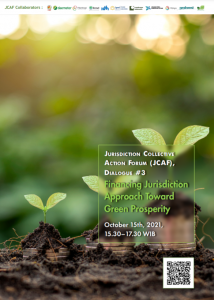EXECUTIVE SUMMARY
The Jurisdiction Collective Action Forum (JCAF) held its third dialogue on October 15th, 2021, focusing on “Financing Jurisdiction Approach Toward Green Prosperity” and diving into regulatory frameworks, principles, standards, and guidelines to mobilize investments for jurisdictional-scale performance from the perspectives of the Indonesian government, non-state actors, donors, and investors. In the spirit of collective actions, JCAF aims to catalyse partnership across leading jurisdictions to advance sustainable commodity production and low carbon growth.
The recent IPCC report has been hailed as the “red code for humanity.” Limiting global warming to 1.5 degrees Celsius, reducing emissions from commodity-driven deforestation and other land-based sectors have never been so critical. The Indonesian government is committed to halting emissions by 29% independently and by 41% with international support by 2030. It has also further allocated 30%-40% of the national budget toward NDC (Nationally Determined Contribution) implementation. Catalyzing transformation toward an integrated and inclusive Jurisdictional approach (JA) offers a solution toward the pursuance of the country’s climate-change agenda.
JA promotes partnership in low carbon development and strengthens sustainable development through inclusive, innovative, sustainable financing for deforestation-free and highly productive agriculture commodities. The experiences of JA in East Kalimantan and Bio-Carbon Fund-ISLF in Jambi, supported by the UK Government and the World Bank, demonstrated that a blended finance scheme is essential to attract sustainable financing to the jurisdictions. Equally critical is the support from governments, especially regarding regulation implementation and enforcement. Forclime shared lessons learned from JA initiatives in West Kalimantan and Central Sulawesi and highlighted the need to lay out a successful benchmark. Further, the Seruyan experience provided some practical steps to implement a jurisdictional approach, such as training, funding, legal documents, shared resources and inclusivity. In conclusion, this approach provides an inspiring vision and a potential entry point for sustainable financing prospects while paving the way toward green prosperity.
